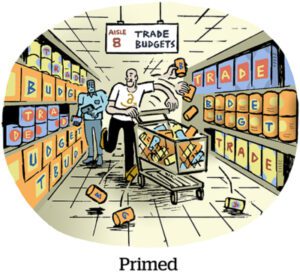Hey Readers,
Welcome to the AdExchanger Commerce Newsletter.
This week, we pull no punches in discussing a major change to how and where US consumers shop online.
For Americans, the “Made in China” tag on most items they own is as familiar as baseball or apple pie.
And that’s because China has long been the manufacturing source for US product makers. But over the past couple of years, Chinese companies have gone from being the backend manufacturers to being the product sellers and marketplaces where American customers increasingly buy their online goods.
Temu and Shein are two of the most prominent. But there are other, quieter examples of Chinese sellers stepping into direct sales roles with Americans alongside Amazon, TikTok and Walmart.
The growth of Chinese sellers has big implications for how Americans shop and what they buy, including knockoff products.
So what?
But isn’t this, like, the free market? And who cares if Chinese sellers are taking over?
Consider this: Chinese consumer tech and ecommerce companies have endeavored for decades to break into the US market. WeChat tried but never cracked the code. Online shopping company Wish stormed in with huge marketing budgets but failed.
So this is an important change.
For one, the rise of Chinese ecommerce sellers is very different from the organic growth of TikTok. Chinese companies like Pinduoduo, which owns Temu, have discovered they don’t need organic traction – or even much of a brand – to generate growth.
With deep enough pockets, an empty shell of an ecommerce business can purchase a top ranking in the App Store, on Google Search, on social media and in marketplaces like Amazon and Walmart so long as their prices are also unbeatably low.
The paid media playbook
These massive Chinese commerce media budgets have paved the way for major changes in how Americans shop.
When Meta last reported earnings, CFO Susan Li disclosed that Chinese advertisers had grown to 10% of revenue, up from 6.5% the year before. Chinese ad budgets were Meta’s greatest tailwind, contributing 5% to worldwide revenue growth year over year. At Meta’s size – $135 billion in total revenue last year – that’s a huge source of net new growth.
Walmart began allowing international third-party sellers in 2021. Chinese sellers, specifically, have outpaced US sellers since 2022 and account for more than 90% of Walmart’s international sellers, according to Marketplace Pulse data from last year.
But this growth of Chinese seller businesses in US marketplaces could lead to uncomfortable trade-offs.
Three DTC sellers tell me they’ve been approached about entering a class-action suit against Walmart because it’s become commonplace for Chinese sellers on the Walmart marketplace to promote and sell knockoff products. These items are often presented as the original brand’s products or have the original brand’s name in the product description.
Get crackin’
On the web, the line between infringement and fair conquesting is pretty thin. A brand can bid on a competitor’s name, stuff a competitor’s product details into its own metadata fields and practically copy and paste a competitor’s text and imagery from product pages.
But fighting infringement and IP disputes with Chinese sellers is another level of complication.
In January, for instance, a novelty US brand called Krak’in (which makes a keychain product for shotgunning beers) sued Temu for IP infringement. The marketplace offered unlicensed knockoffs, many of which borrowed the Krak’in name or placed the name in their URL or other metadata fields.
Importantly, Temu advertised those products as ostensibly the original. Until recently, you could run a Google Search for “Krak’in, Temu” and find an old product listing (now removed) that copied the Krak’in product and carried the name in its metadata. The Google crawler remembers, although the item has been discontinued. (In case the link disappears, we gotchu.)
Krak’in and Whaleco, the Pinduoduo subsidiary that operates Temu in the US, settled out of court last week.
Krak’in didn’t win, mind – the case was “dismissed with prejudice.” It did succeed, however, in putting a stop to Temu’s shenanigans with Krak’in’s IP, for now at least.
Suing Temu one product listing at a time and settling out of court is, unfortunately, the quickest and easiest way for a brand to prevent the most voracious Chinese underseller from copying and reselling a product.
 Eastbound and down
Eastbound and down
Meanwhile, the biggest advertising and product discovery platforms (aka the walled gardens) are in a somewhat awkward position.
Google, Meta, Amazon and Apple have benefited from waves of ad budgets in the past. Back in the day, it was Farmville-style mobile games, and more recently it’s been AI and crypto advertisers, with many others in between.
What’s different this time is that the platforms will be forced to choose between their own bottom lines, which are boosted heavily by Chinese ecommerce sellers, and the experience of users shopping on their platform.
When Amazon reported earnings in February, there was an update to its risk disclosure statement. That section of its SEC filing now ends with:
“In addition, because China-based sellers account for significant portions of our third-party seller services and advertising revenues, and China-based suppliers provide significant portions of our components and finished goods, regulatory and trade restrictions, data protection and cybersecurity laws, economic factors, geopolitical events, security issues, or other factors negatively impacting China-based sellers and suppliers could adversely affect our operating results.”
Amazon expelled thousands of Chinese seller accounts in 2021 in response to a period of fraud and platform abuses, including false reviews and sabotaging competitor pages. But Amazon’s new risk disclosure points to how this problem has metastasized and will pose a bigger challenge the next time Amazon is compelled to quell Chinese sellers.
The growth of China-based sellers has reached the point where setbacks in that category will impact operating results. The same goes for other major marketplaces and ad platforms, like Walmart, Google and Meta.
None of those companies are known for making deliberate moves that reduce their own revenue and profitability – but they may soon have to. Otherwise, the losers in this scenario are American brands and customers.
















